For several years when I was in college, some 4,000 years ago, I was in the habit of getting as drunk as possible as frequently as I could. Youthful exuberance? Existential despair? Undiagnosed depression? Probably a little of all of them. But it led to some interesting moments.
One of these occurred on a fine Saturday afternoon, when my roommate announced that we were going to see a lecture given by the famed mathematician Benoit Mandelbrot, who coined the term "fractal," and was the first person to realize that certain elements of nature – coastlines are the examples frequently used – retain their shape regardless of the distance from which they are viewed.
In other words, the rocky, jagged pattern of a coastline that you see when you stand on it is exactly replicated (at a much larger scale) if you look at that same coastline from space. Zoom in on a picture of one of Mr. Mandelbrot's fractals, and that's what you see: a shape repeating itself over and over again, at every scale.
It was a small auditorium that Mr. Mandelbrot was speaking in that afternoon. Perhaps forty or fifty seats, and only a third full. My roommate was a brilliant student of the sciences (he is now a physicist at Lockheed Martin) and sat us second row, center. Mr. Mandelbrot began his presentation, and I, who had spent the previous night drinking until my head fell off, and perhaps was already drinking that afternoon – my memory here, as in so many things, is a bit spotty – sitting twelve feet from the great man, promptly passed out.
I do not know if I snored or drew giggles from other members of the audience, but I do know that Mr. Mandelbrot could not have but noticed me. Was he outraged? Bemused, thinking of his own school days? Tolerant? Happy to get through the talk and retreat with the faculty to some lounge or another for drinks and the kind of small, cheap snacks colleges tend to serve at these events?
Who knows? But it is an image that's been on my mind, not because I have the urge to make any deep philosophical points about youth, but because I've been thinking about Mr. Mandelbrot and his fractals.
Specifically, I've begun to wonder if natural shapes are not the only things that replicate themselves at different scales.
Maybe cultural artifacts do as well.
Maybe it's the case that movies are like fractals.
Maybe our most important movies have the exact shape of American, or some element of that culture, in perfect, replicating miniature, so that by examining them we can see the shape of that culture, in the same way that by examining the coastline at our feet we can see the shape of the whole continent.
Apocalypse Now (1979) is among that handful of American movies from the 1970s that are as good as any ever made.
It's based on the Joseph Conrad novella Heart of Darkness (1899) about a British sailor who journeys up a river in Africa to find a European ivory trader who has apparently set himself up as a kind of divine king, ruling over the indigenous people there.
This story was adapted by John Milius, an occasionally wonderful writer (and perhaps a political "conservative" in some senses of the word) into a script with which filmmaker Francis Ford Coppola (who was perhaps a political "liberal" in some senses of the word) decamped to the Philippines for (famously) 238 days of shooting, continual rewriting, drug and alcohol abuse, and generalized chaos. The script's voiceover was written in part by Michael Herr, a war correspondent whose Dispatches is one of the finest books ever written about the Vietnam War.
In the film, Conrad's British sailor becomes an American soldier in Vietnam named Captain Willard (Martin Sheen). He is sent on a mission to find and kill another American soldier, Colonel Kurtz (Marlon Brando), who has gone mad and sent himself up as a kind of divine king across the border in Cambodia, ruling over the indigenous people there.
This journey takes Willard up a river through the entire swath and texture of the war, from helicopter assaults on the coast to USO performances by Playboy bunnies to American encampments in the jungle that are in danger of being overrun. He eventually finds Kurtz's basecamp in Cambodia, which is a place of violence and madness. Kurtz and his people are living among ancient crumbling buildings festooned with human bodies.
Kurtz knows that Willard has come to kill him. But instead of preventing him from doing so, he eventually gives the act his blessing. So Willard murders him with a machete while the indigenous people are slaughtering a cow outside, all of it set to the strains of "The End" by The Doors.
The film is clearly intended to be a meditation on the disastrous American involvement in Vietnam (which dismayed Milius, who was outraged that the the rat-fink liberal Coppola (who was a close friend) would put his script to such purposes). And it indeed has a tremendous amount to say about the war.
But as I've watched the course of American politics over the past several months, I’ve begun to wonder if Apocalypse Now is maybe even more important as a way of understanding – like Mr. Mandelbrot's fractals – the American experience itself, if it's permissible to talk about that as a thing (which I'm going to do anyway, permissible or not).
More than any nation I'm aware of, America is fond of framing its history as a journey.
This begins geographically, with a nation that was founded through a continual process of expanding westward across a continent. This voyage westward – so often framed as an attempt to secure a better life for oneself – is one of the fundamental metaphors of American existence, and its symbols (think of the stereotypical "pioneers" in their "covered wagons" or of the "gold rush" or even the myth and location of Hollywood itself) form some of our central iconography.
Beyond this, there's also the geographical fact that because of its size and the vagaries of its history, our culture has long been obsessed with the ideas of roads and travel.
Think of our foundational literature, from Moby Dick, which is essentially the story of a long, doomed journey, to works like On The Road, which seems to so well sum up the desire of so many Americans to simply get out and move, baby, move. Or think of the Great Migration of black Americans north in the wake of the Civil War, or of the cultural importance of "the road trip," as expressed in everything from It Happened One Night (1934) to National Lampoon's Vacation (1983).
The notion of the journey is so central to our experience that it also defines our political language.
The words on the Statue of Liberty welcome foreign journeyers to our country, and the idea of the "city on a hill" relies on a vision of something seen from afar, something dim but glorious in the distance, eternally to be approached. Similarly, our claims of Manifest Destiny are also based on the idea of a movement towards something, as are our articulations of the "American Dream" of becoming something better than you are.
It is restless land, going somewhere, never content, always on the make.
But the single most important metaphor of a journey in American life is encapsulated in the experience of the first Europeans who came to this continent.
They were confronted with an abundance of natural life which they struggled to comprehend – Columbus, in a letter detailing his first voyage, called the new world "fertile to a limitless degree" – and for which they only had one real point of comparison in their minds: Biblical description.
On the one hand, the fecundity of the North American continent was so astounding that the Europeans were drawn to thinking of it as a kind of garden of Eden.
The Puritans, in particular, were coming from a Europe that was rapidly being deforested. This was already causing shortages of firewood; the resultant increase in coal burning would help cause the environmental degradation and air pollution which was so much a part of life in the industrializing world in the following centuries. (It's a fascinating side note that it was in part this pollution that helped prove the case for evolution in the 19th Century, in the form of the famous case of the Peppered Moth population, which changed color from white to black over the course of decades in order to better survive in their new soot-stained environment.)
So these Puritans sailed west across the sea and came to a new continent that was, in the words of one of the passengers on the Mayflower, "wooded to the brink of the sea" with "the greatest store of fowl that we ever saw" and where "every day we saw whales playing hard by us."
Eden indeed.
And yet, as writers like Roderick Nash pointed out long ago, the Puritans were presented with a problem.
This was because their minds contained another, directly contradictory image for this wild land they had encountered: the desert that is the haunt of Satan in the Bible, a place of terror and torment, which is again and again referred to in that book by the word "wilderness."
A simple search of the internet can find a legion of explorations of this notion; here's one, chosen more or less at random, that seems representative. It's from the website of a South Carolina pastor with the wonderful name of Nick Batzig.
Batzig starts by explaining that "When Adam sinned, he lost communion with God and was exiled from the Garden-Paradise in which he was placed into the spiritually barren wasteland of the wilderness of this fallen world."
Because of this exile, what we would think of as the natural world – places untouched by the human hand – took on terrible qualities. As Batzig puts it, in the Bible, "wilderness denoted everything painful and trying," which because of its terror and barrenness was "a painful reminder of the sinfulness of the human heart."
Perhaps most importantly, the wilderness was the dominion of Satan.
It was the place not where you went to commune with trees or feel restored, but where you wrestled with evil itself. "When Christ began his ministry," Batzig explains, "he was driven by the Spirit into the wilderness to be tempted by the devil."
And because of this, in Batzig's reckoning, one of the most vital goals of Christianity (then and now) is "to turn the wilderness of [our] sin-laden and sin-cursed world into a Garden-Paradise."
So the journey of the first white Americans instilled into them a terrible dichotomy.
This place in which they had found themselves by following God's orders, the so-called New World, was at the same time Edenic and Satanic.
It was a place of immeasurable bounty and divine potential; it was also a terrifying domain of evil, out of which the sin must be burned by any means necessary.
But this wasn't just their dichotomy. It's ours as well, for it has shaped huge swaths of our thought.
To take one of many examples, this dichotomy is one of the foundations of the way white America has approached minorities throughout its history.
The indigenous people of the continent – in everything from the way they were described by explorers to their portrayals in the Western movies of the 20th Century – were at once "noble savages," simple and beatific and innocent…and also terrifying dark-skinned Others, emissaries of Satan who had to be converted or exterminated.
Similarly, Black Americans have long been seen, down in the sub-basements of the white American consciousness, as simple, noble beings who encapsulate our better angels (from Sambo to the Magical Negro to the continual attempts of white Americans to co-opt the ideas of MLK Jr. for whatever cause they believe in)…and also as terrifying figures residing in the new wilderness of the "ghetto," given to mindless rioting and thuggery and who must be incarcerated for their own good and the good of society.
This dichotomy between divinity and sin, nobility and exterminating terror, triumph and horror, is also the one that lies at the center of Apocalypse Now.
It is clear from fairly early in the film that Captain Willard is journeying up the river ultimately to wrestle with some version – perhaps alternate version, perhaps future version – of himself.
The film opens with an extraordinarily beautiful image of airplane-dropped napalm destroying a tree line while Jim Morrison of The Doors croons the lyrics to "The End."
It's an image of sublime destruction that exactly anticipates the violence and soundtrack with which the film will end. In the voiceover following this, Willard notes that "I wanted a mission, and for my sins they gave me one."
Willard, it becomes clear, is not simply a soldier; he is an assassin who works for the U.S. Government in a covert capacity. "How many people had I already killed?" he asks. "There were those six that I knew about for sure. Close enough to blow their last breath in my face."
In part, these were his sins, the things he had done in the wilderness.
Despite this, however, Willard is still at the start of his journey, still clinging to the Edenic side of the register: he is still a believer in the nobility of America.
He is still willing to accept the job of killing a fellow American, to believe that this will further the cause of the war and of the nation itself. Willard is far from an innocent. But he is still in possession of some traces of innocence, has yet to be exposed to the what the final, whispered words of the film (taken directly from Conrad's novel) will term "The horror. The horror."
This idea is reinforced in the scene in which Willard is actually given the mission, told by a general that he is to "terminate" Kurtz's command, with "extreme prejudice."
The general explains:
Walter Kurtz was one of the most outstanding officers this country has ever produced. He was brilliant. He was outstanding in every way. And he was a good man, too. A humanitarian man. A man of wit and humor. He joined the Special Forces, and after that his ideas, methods, became unsound.
Here is Kurtz's (and Willard's) story summed up. They were good men of nobility who journeyed into the madness of the American adventure in Vietnam and became…something else.
This is, of course, Coppola's (if not Milius's) summation of what happened to America itself in and through the Vietnam War.
Beyond that, however – and this is where the film retains its tremendous cultural relevance – this is also the central question posed by the American experiment: if it is allowed to rush forward unchecked and unconsidered, where will it lead us?
It is essential to understand that Donald Trump, like Walter Kurtz, is not an aberration so much as an epitome.
In the beliefs and actions of the MAGA junta and its followers, as in Apocalypse Now, is something of the fractal pattern which, when expanded to the scale of culture and history, can show us a part the outline of America itself.
What is it that drives Walter Kurtz into the jungle? At base, it seems to be a frustration with constraints. He feels he is not allowed to, or has not been given the means to, win the war the way he would like.
He explains this very clearly in an anecdote he relates to Willard. When he was a Special Forces officer, Kurtz says, he went into a village to inoculate children for polio. After this, the Viet Cong came to the village and cut off the inoculated arms of the children, as a warning to the villagers about collaboration or even interaction with the Americans.
At first, on seeing what had happened, Kurtz wept. But then, he tells Willard,
I realized, like I was shot, like I was shot with a diamond, a diamond bullet right through my forehead. And I thought, my god, the genius of that. The genius. The will to do that. Perfect, genuine, complete, crystalline. Pure. Then I realized they were stronger than we, because they could stand it; these were not monsters, they were men. Trained cadres. These men, who fought with their hearts, who had families, who had children, who were filled with love, but they had the strength, the strength to do that. If I had ten divisions of those men, then our troubles here would be over very quickly.
Here is the very heart of the matter. Here are Trump and Musk and DOGE and MAGA and American capitalism.
There is a vision. Of a freedom so great as to be subject to no restraint at all. Of personal wealth. Of imagined "greatness," of Caesars being showered with blossoms in the street by adoring populations. Of triumph. Of purity (both racial and ideological). Of a crystalline, if purely illusory, "efficiency."
This vision is born, for the fascist Right that is ascendant in America, out of a frustration with the kind of political and cultural compromises (the fact that minorities and women might have rights, that Hollywood may not agree with them, that not everyone adulates billionaires) that they see as defeats. It is born out of a furious resentment.
For Kurtz, the frustration is that the U.S. is unable to defeat the North Vietnamese and Viet Cong; for MAGA, the frustration is that the nation will not simply accede to their vision of the holiness of unfettered crony capitalism buttressed with punitive morality.
And what does it take to vanquish everything in their way, to cut off the arms of the children of the populace who would stand against them?
Will. Pure, crystilline, will. The ability to accept cruelty and inhumanity so that they may triumph.
And so, over the past quarter century, like Kurtz, the Republican party pushed further and further past the boundaries of rationality, up the river until they found their godhead in Donald Trump.
The American social vision has always been one of both Eden and Hell.
Like Puritans arriving on the shores of North America, there has always lain before us a paradise of yeoman individualists starting small businesses and rising up to become captains of industry, of noble lawmen single-handedly fighting off hordes of Indians/gangsters/middle eastern terrorists/alien invaders, of wealth unconstrained by the limits of community.
This is Willard and Kurtz, young men joining the special forces to spread the gospel of America with sword and flame.
But we have never been able to escape the dark side of that same image. The annihilation that attended the march across the continent, the slavery that fueled the industrial progress, the sprawling tenements that were the necessary result of the Gilded Age, the subjugation of women, the atomic bombs, the vast alienation that goes hand in hand with the radical internet life of self-promotion and mindless consumption.
It is vital to note, however, that it is not simply the things we have done in pursuit of greatness that inspire fear; freedom itself is also a repository of terror.
Freedom is Eden, for MAGA. But freedom is also the horror of the wilderness.
Freedom is the haunt of Satan, because it is also populated by hippies and poets and queers and readers of subversive philosophy and economics, folks for whom gender is not fluid and power structures are meant to be questioned and not obeyed, madmen who want to argue that there is something more to existence than atomized financial beings fighting against one another tooth and claw.
Which is to say that for MAGA freedom is holy…but only if, like the wilderness, it can be conquered, dominated, shaped, put under violent constraint, in an attempt to contain its terror.
In a recent article in the London Review of Books, Peter E. Gordon notes that capitalism "is less a system than an anti-system, an irrational and ever changing flux of conditions and counter-conditions that are always moving towards crisis."
This is right. It is also a fine description of the American obsession with freedom.
This obsession is an anti-system. It is flux. It is always moving towards crisis, because crisis provides the justification for the other vision of the American journey, the witch-burning, lynching imposition of violent order that is, at base, a result of fear.
Freedom provokes crisis, which in turn makes the violent reaction to the fear feel comforting, necessary, just as the invocation of "lawless scum invading the streets" becomes the psychological grounds for the vigilante action movies that are such a staple of our nation's entertainment.
Eden for MAGA is a world in which they have the perfect, crystalline will to be this free. To win without remorse. To cut off the arms of children to make an example. To loose the dogs of their unfettered ideology and keep order by the violent imposition of a police state, controlled by the king at the top. They dream of what Kurtz dreamed of.
And Kurtz was insane.

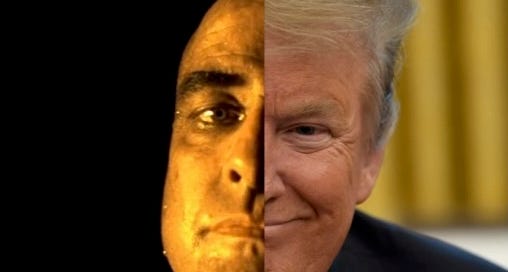


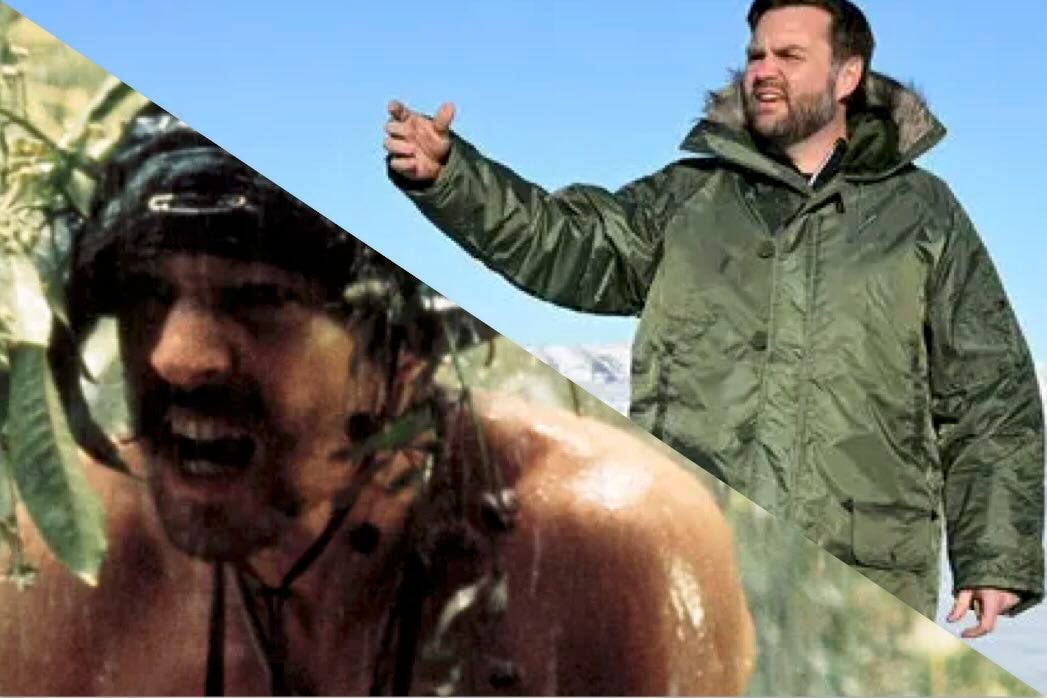
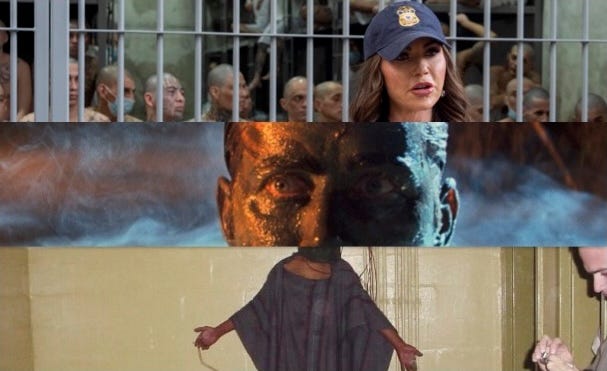
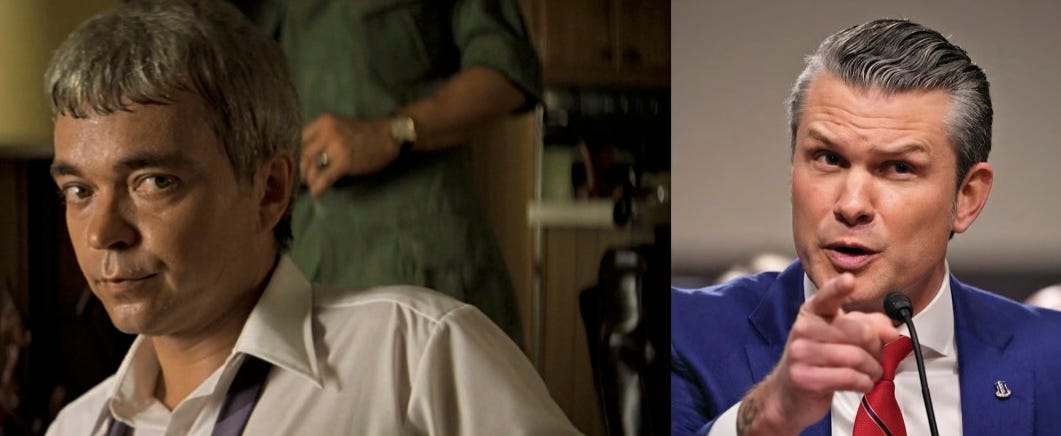
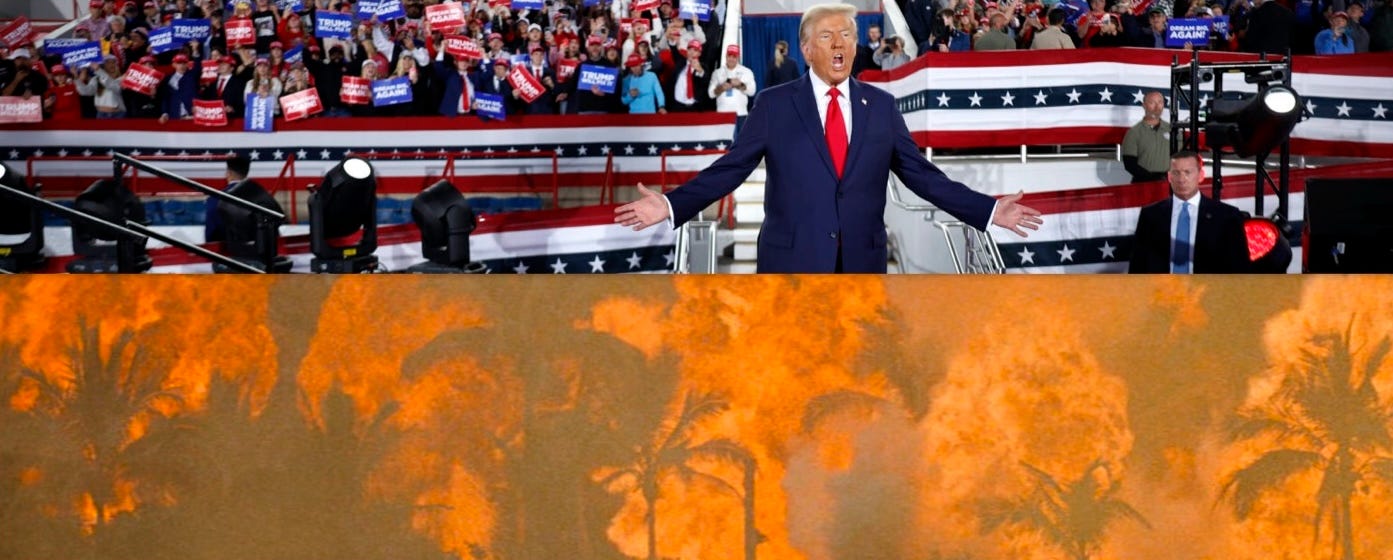
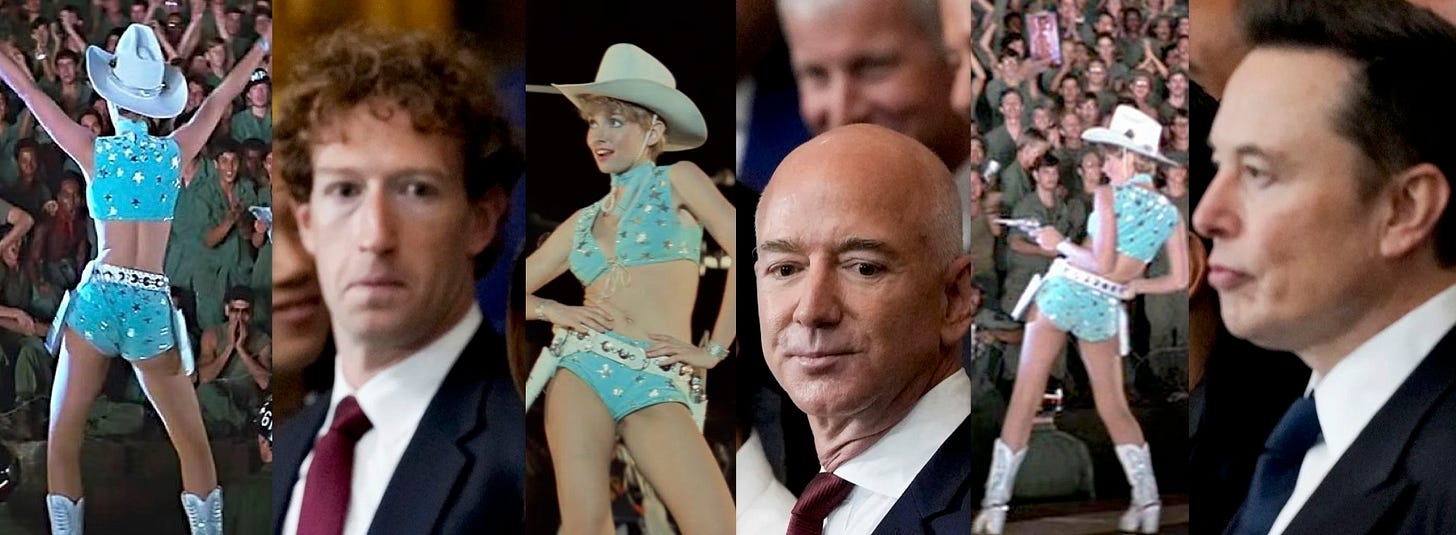
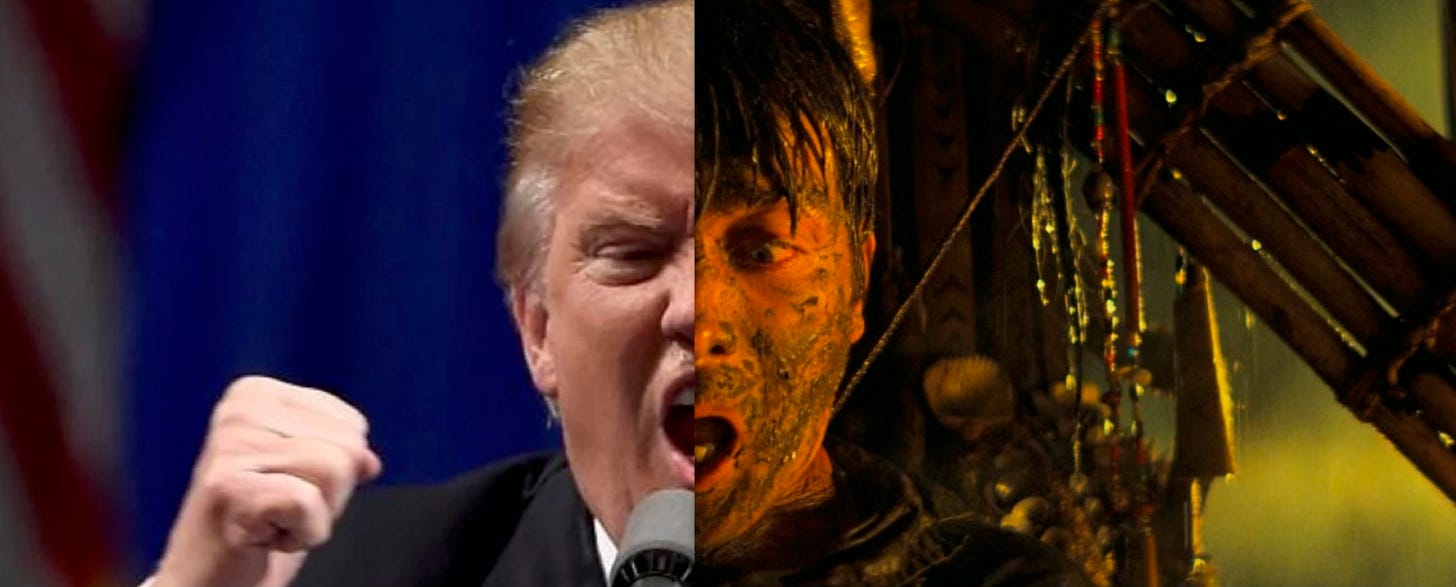
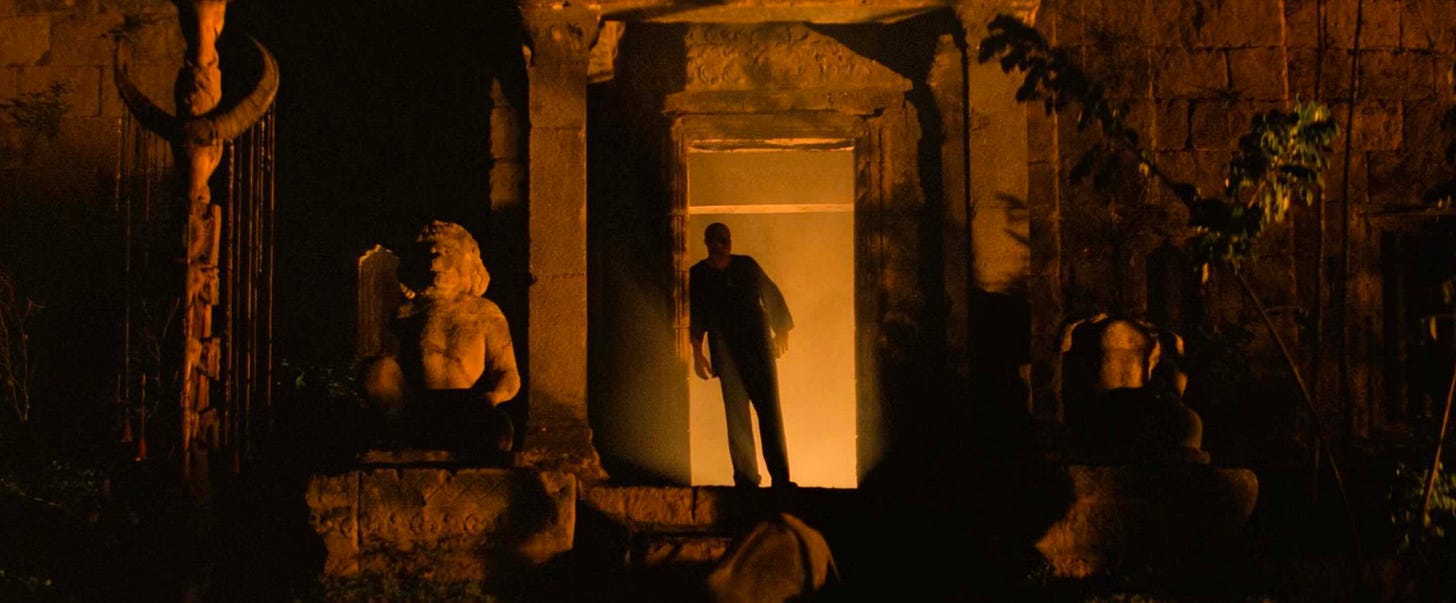
I think this is one of the very best things you've written on here.
"our culture has long been obsessed with the ideas of roads and travel"
And of course, the road film was invented in the US and remains largely a US-centric genre. I had always assumed that it had something to do with the unique elements, cultural and photographic, of a country that is massive, beautiful, sparsely populated (relatively) and organized around smallish enclaves separated by miles and miles of empty road (which means that going anywhere or doing anything pretty much requires a road trip), but you make a very good case for the road film as the natural extension of a broader cultural, idealistic pursuit.
"The film opens with an extraordinarily beautiful image of airplane-dropped napalm destroying a tree line while Jim Morrison of The Doors croons the lyrics to "The End."
I'm glad I'm not the only one who feels this way. It's a gorgeous image, one of my favorites in all of cinema, but I always feel bad about liking it.
"Freedom provokes crisis, which in turn makes the violent reaction to the fear feel comforting, necessary,"
One of the things my parents always told me is that there is absolutely no argument that the US is, by far, the freest country in the world, and by a wide margin, when it comes to individual liberties. But it possibly the only country in the world in which individual liberties trump collective freedoms. I didn't always agree, not completely anyway, but it's hard for me not to these days. And your point is absolutely true: it's these same people that are so preoccupied with freedom at the individual level (the originalists, the gun nuts, the MAGA crowd) that desperately seek out and cling to authoritarians who they feel will protect them, even at the expense of those very same freedoms. I used to think it was cognitive dissonance, but I've changed my mind. I think that they are coherent in their ideology, and the so-called dissonance just the product of semantics. When they say freedom, they aren't referring to a value or a principle or a human right. They are referring to the ability to do what they want, when they want, often at the expense of others, and for others to be deprived of the ability to do anything about it. Seen though that lens, it's all perfectly logical.
"And Kurtz was insane."
I struggle a bit with envisioning Trump as Kurtz just because I love 'Apocalypse Now' so much, and because I view the monstrous Kurtz as a wee bit of a tragic, self-loathing figure (who has actually read a book or two), but the thing about the followers, yes. Absolutely. An army that willingly follows a decrepit, incoherent lunatic, despite being at least somewhat aware of the fact he is a decrepit, incoherent lunatic, just because he gives them permission to act out their most sadistic fantasies under the guise of some vague, impending victory of some sort. 100%.
This is brilliant writing Tyler. I know a few of those Williams drinkers, having been one as well and had similar experiences as the one you opened with. I know we were all capable of having conversations like this but writing it down as you have is exceptional.
Most of us chose to join the parable you write about: doctors, lawyers, captains of industry. I worked to help build and sell the technology infrastructure that has been harnessed by our oligarchs to control the minds of the uneducated with disinformation. Today I am willing to do most anything to stop the unfettered trampling of our government in the name of freedom.
Editor's note... small grammatic commission here: " if it allowed to rush forward unchecked and unconsidered, where will it lead us?"
Did you ever step on a rugby pitch while in that small Massachusetts town?